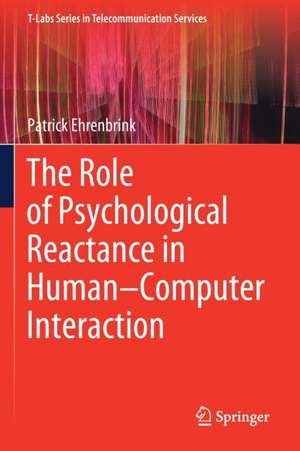The Role of Psychological Reactance in Human–Computer Interaction: T-Labs Series in Telecommunication Services
Autor Patrick Ehrenbrinken Limba Engleză Paperback – 7 noi 2020
| Toate formatele și edițiile | Preț | Express |
|---|---|---|
| Paperback (1) | 380.25 lei 43-57 zile | |
| Springer International Publishing – 7 noi 2020 | 380.25 lei 43-57 zile | |
| Hardback (1) | 387.58 lei 43-57 zile | |
| Springer International Publishing – 7 noi 2019 | 387.58 lei 43-57 zile |
Din seria T-Labs Series in Telecommunication Services
- 15%
 Preț: 640.55 lei
Preț: 640.55 lei - 15%
 Preț: 641.20 lei
Preț: 641.20 lei - 15%
 Preț: 642.83 lei
Preț: 642.83 lei - 15%
 Preț: 639.25 lei
Preț: 639.25 lei - 24%
 Preț: 633.86 lei
Preț: 633.86 lei - 15%
 Preț: 642.03 lei
Preț: 642.03 lei - 20%
 Preț: 645.31 lei
Preț: 645.31 lei - 15%
 Preț: 644.63 lei
Preț: 644.63 lei - 20%
 Preț: 579.77 lei
Preț: 579.77 lei - 15%
 Preț: 641.53 lei
Preț: 641.53 lei - 15%
 Preț: 644.82 lei
Preț: 644.82 lei - 15%
 Preț: 638.24 lei
Preț: 638.24 lei - 20%
 Preț: 702.56 lei
Preț: 702.56 lei - 18%
 Preț: 999.45 lei
Preț: 999.45 lei - 15%
 Preț: 641.03 lei
Preț: 641.03 lei - 15%
 Preț: 637.46 lei
Preț: 637.46 lei - 18%
 Preț: 719.59 lei
Preț: 719.59 lei -
 Preț: 378.54 lei
Preț: 378.54 lei - 15%
 Preț: 639.08 lei
Preț: 639.08 lei - 15%
 Preț: 637.13 lei
Preț: 637.13 lei - 15%
 Preț: 642.68 lei
Preț: 642.68 lei - 15%
 Preț: 640.06 lei
Preț: 640.06 lei - 15%
 Preț: 652.31 lei
Preț: 652.31 lei - 15%
 Preț: 642.03 lei
Preț: 642.03 lei -
 Preț: 386.61 lei
Preț: 386.61 lei - 20%
 Preț: 552.67 lei
Preț: 552.67 lei - 15%
 Preț: 645.47 lei
Preț: 645.47 lei - 15%
 Preț: 636.94 lei
Preț: 636.94 lei - 15%
 Preț: 642.18 lei
Preț: 642.18 lei - 15%
 Preț: 632.70 lei
Preț: 632.70 lei - 15%
 Preț: 638.24 lei
Preț: 638.24 lei - 20%
 Preț: 648.95 lei
Preț: 648.95 lei - 18%
 Preț: 943.57 lei
Preț: 943.57 lei
Preț: 380.25 lei
Nou
Puncte Express: 570
Preț estimativ în valută:
72.77€ • 75.51$ • 60.82£
72.77€ • 75.51$ • 60.82£
Carte tipărită la comandă
Livrare economică 17-31 martie
Preluare comenzi: 021 569.72.76
Specificații
ISBN-13: 9783030303129
ISBN-10: 3030303128
Pagini: 143
Ilustrații: XIII, 143 p. 17 illus., 10 illus. in color.
Dimensiuni: 155 x 235 mm
Greutate: 0.23 kg
Ediția:1st ed. 2020
Editura: Springer International Publishing
Colecția Springer
Seria T-Labs Series in Telecommunication Services
Locul publicării:Cham, Switzerland
ISBN-10: 3030303128
Pagini: 143
Ilustrații: XIII, 143 p. 17 illus., 10 illus. in color.
Dimensiuni: 155 x 235 mm
Greutate: 0.23 kg
Ediția:1st ed. 2020
Editura: Springer International Publishing
Colecția Springer
Seria T-Labs Series in Telecommunication Services
Locul publicării:Cham, Switzerland
Cuprins
Introduction.- Part I.- Motivation.- Part II Relevance of Psychological Reactance in Human-Computer Interaction.- Psychological Reactance Relevant for Human-Computer Interaction.- Literature Search – Reactance in Literature.- Expert Survey-Triggers for State Reactance.- Smart Home Study-Trait Reactance.- Intermediate Discussion on the Relevance of Psychological Reactance for Human-Computer Interaction.- Part III Measurement of State Reactance.- Research Question: How can State Reactance be Measured.- Reactance Scale for Human-Computer Interaction.- Validation.- Intermediate Discussion on the Reactance Scale for Human-Computer Interaction.- Part IV Determinants of State Reactance.- Research Question: What Factors Influence State Reactance.- Persuasive Assistant Study-Moderator Variables.- Intermediate Discussion on Determinants of State Reactance.- Part V General Discussion.- Research Outcomes.- Outlook and Future Research.- Conclusion.
Notă biografică
Patrick Ehrenbrink studied Cognitive Science at University of Osnabrück and Human Factors at Technische Universität Berlin. He completed his PhD at the Quality and Usability Lab at Technische Universität Berlin. He was also appointed as a Research Fellow at the University of Technology, Sydney. He has published in several major journals and conference proceedings.
Textul de pe ultima copertă
This book provides an in-depth investigation on the psychological phenomenon "reactance“ in the context of Human-Computer Interaction (HCI). The author argues that the complexity and autonomy of modern technology can sometimes be overwhelming and can then be perceived as a threat to freedom by its users, thereby diminishing acceptance. The book investigates if and how this is the case and provides strategies to regain the lost acceptance. Topics include relevance of reactance on HCI, triggers for reactance, consequences of reactance, measurement of reactance, and countermeasures to reactance.
- Provides an analysis of the phenomenon of psychological reactance to technology in the context of HCI;
- Presents strategies to increase user acceptance of complicated or intimidating technology;
- Includes measurement tools for psychological reactance.
Caracteristici
Provides an analysis of the phenomenon of psychological reactance to technology in the context of HCI Presents strategies to increase user acceptance of complicated or intimidating technology Includes measurement tools for psychological reactance
